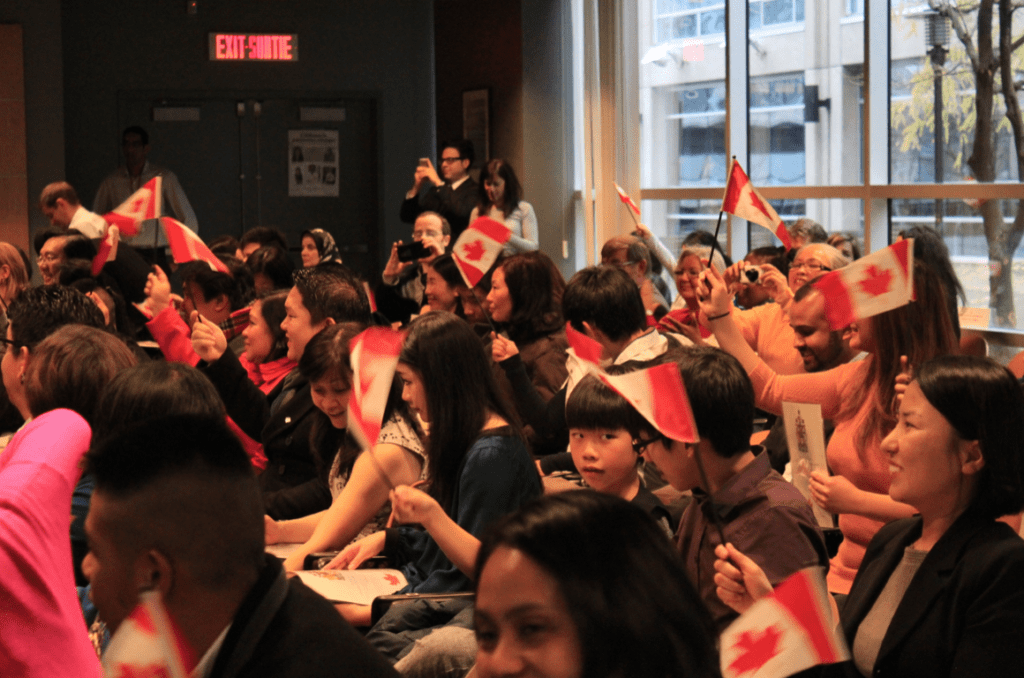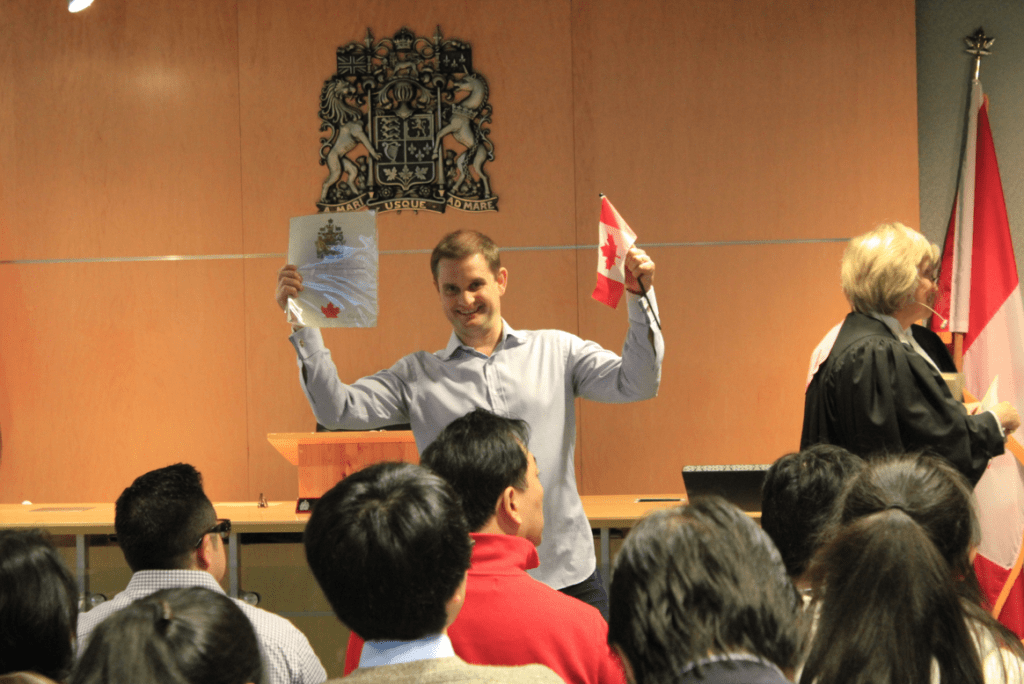We share the changes to requirements and how they impact you. Read our step-by-step guide to the process and learn about the advantages of Canadian Citizenship over Canadian Permanent Residency.
Do you want your own little blue book, we show you how.
New Canadian Citizenship Requirements
Application requirements include a formal application to Immigration Refugee Citizenship Canada including;
- New legislation: 1,095 days Day Rule: you are required to spend a minimum of 3 years, out of the previous 5 years in Canada before submitting an application, time spent in Canada as a temporary resident now counts as half.
- The requirement to spend six months out of each calendar year has been repealed
- Tax requirements, applicant must file taxes if required to do so for 3 out of 5 years
- Upfront evidence of adequate knowledge of one of Canada’s official languages: English or French
- Citizenship test
Think you might be eligible to apply for Canadian Citizenship? Contact us and see if you qualify!
Getting Canadian Citizenship-How to.
Citizenship can only be obtained through legal Permanent Residency in Canada or through very specific family ties to a Canadian Citizen.
Steps in the process:
- Formal application
- Tax requirements
- Citizenship test
- Citizenship interview
- Citizenship Ceremony: loyalty oath and pledge of commitment to Canadian values
Why is Canadian Citizenship so prized?
Canadian Citizenship offers:
- Inalienable rights, such as equality, freedom from oppression, and freedom of assembly, as well as responsibilities, namely to abide by Canadian laws
- A Canadian Passport, allows visa-free travel to over 140 countries
- The right to vote
- NAFTA labor mobility benefits
- No physical Residency Obligations
- A sense of security in knowing that your status can’t be easily revoked
Canada’s national symbol; the maple leaf
Read about the changes in detail and how they impact you
On June 19, 2017, Bill C-6 received Royal Assent. Bill C-6 is an Act to amend the Canadian Citizenship Act. Some of the changes immediately took effect in June; some, after months of waiting, came into effect on October 11, 2017.
June 19, 2017
Previously in June, the Act made some changes regarding Citizenship revocation, intention to reside in Canada after Citizenship is granted, getting Canadian Citizenship application for minors, and a few others.
Dual Citizen Citizenship Revocation
Before Bill C-6, under the Citizenship Act, getting Canadian Citizenship could be revoked from dual citizens convicted of crimes against the national interest. This has been repealed; dual citizens will now face the Canadian justice system just as any other Canadian Citizen.
Intention to Continue Residing in Canada
Also, the provision requiring new Canadians to intend to stay in Canada is repealed. Applicants are no longer required to intend to continue to live in Canada once granted of getting Canadian Citizenship. This eliminates the worries from those who may have to live abroad for any reason.
Minors’ Application for Citizenship
The age requirement for getting Canadian Citizenship has been removed under subsection 5(1); minors without a Canadian parent could apply for Citizenship more easily. A legal guardian of the minor can now apply for getting Canadian Citizenship on behalf of the minor.
New Canadians Celebrating at a Citizenship Ceremony in Vancouver
The latest changes October 11, 2017
Major changes relate to physical presence in Canada, tax requirements, and language and knowledge requirements.
Physical Presence
Permanent residents were originally required to be physically present in Canada for 4 years (1,460 days) in the last 6 years, with at least 183 days in 4 out of the 6 years.
Now, permanent residents only need to be physically present in Canada for 3 years (1,095 days) in the last 5 years. Also, every 2 days spent in Canada, as student, worker or protected person, prior becoming permanent residents may be counted as 1 day towards their physical presence, maximum 365 days.
For example if a person became Permanent Resident 2 years ago and previously was in Canada as a worker for 2 years before becoming a Permanent Resident they can apply right away. This is because they have 2 years as a permanent resident and are entitled to count half of the time they were in Canada as a temporary resident. Giving them a total of 3 years in the last 5 years.
Tax Requirements
Permanent residents must file their income taxes with Canada Revenue Agency, if required under the Income Tax Act, for 3 out of 5 years, matching the new physical presence requirements.
Language & Knowledge Requirements
In order to become Canadian Citizens, permanent residents have to demonstrate that they have adequate knowledge of one of the official languages of Canada and knowledge of Canada and of the responsibilities and privileges of getting Canadian Citizenship. The age range that is required to meet the above is reduced from 14 – 64 to 18 – 54.
Upcoming
More changes to strengthen the citizenship revocation process and give clear authority under the Citizenship Act for citizenship officers to seize fraudulent or suspected fraudulent documents are expected to take place later this year and in 2018.
Yours truly, becoming a Canadian!
For more detailed comparisons of Bill C-6 amendments and the previous Canadian Citizenship Act, please see the chart below.
|
Changes that took effect immediately upon Royal Assent on June 19, 2017 |
|
|
Before |
Citizenship could be revoked from dual Citizens convicted of treason, spying, and terrorism offenses, depending on the sentence received, or who was part of an armed force of a country or organized group engaged in conflict with Canada. |
|
Now |
This provision is repealed. Dual citizens living in Canada who are convicted of these crimes will face the Canadian justice system, like other Canadian Citizens who break the law. |
|
Before |
Applicants were required to intend to continue to live in Canada if granted Citizenship. |
|
Now |
This provision is repealed. Applicants are no longer required to intend to continue to live in Canada once granted citizenship. This removes concerns from new Canadians who may need to live outside of Canada for work or personal reasons. |
|
Before |
The Minister had the discretion to waive certain requirements under subsection 5(1) of the Citizenship Act so a minor could obtain Citizenship without a Canadian parent. |
|
Now |
It is now easier for minors to apply for Citizenship without a Canadian parent, as the age requirement for Citizenship has been removed under subsection 5(1). A person having custody of the minor or empowered to act on their behalf by court order, written agreement or operation of law, can now apply for citizenship on behalf of the minor, unless that requirement is waived by the Minister. |
|
Before |
No provision existed to prevent individuals serving a sentence in the community (a conditional sentence order) from being granted Citizenship, taking the Oath of Citizenship or counting this time towards meeting the physical presence requirements for citizenship. |
|
Now |
Individuals serving a conditional sentence will not be granted Citizenship, take the Oath of Citizenship, or be able to count this time towards meeting the physical presence requirements for citizenship. |
|
Before |
The Minister has the discretion to grant Citizenship to a person to alleviate cases of special and unusual hardship, or to reward services of exceptional value to Canada. |
|
Now |
Statelessness has been added as a ground that can be considered for a discretionary grant of Citizenship. |
|
Before |
The department had reasonable measures to accommodate the needs of Citizenship applicants. However, there was no explicit reference to accommodate persons with disabilities in the Citizenship Act. |
|
Now |
The requirement to take into consideration reasonable measures to accommodate the needs of a Citizenship applicant who is a disabled person is now included in the Citizenship Act. |
|
Before |
The requirement for applicants to maintain the requirements for Citizenship from the time they apply for Citizenship until taking the Oath of Citizenship only applied to applications received on or after June 11, 2015. |
|
Now |
This requirement now applies to all applications, including those received before June 11, 2015. |
|
Changes to take effect as of October 11, 2017 |
|
|
Before |
Applicants had to be physically present in Canada for four out of six years before applying for citizenship. |
|
Now |
Applicants must be physically present in Canada for three out of five years before applying for citizenship. |
|
Before |
Applicants had to file Canadian income taxes if required to do so under the Income Tax Act, for four out of six years, matching the physical presence requirement. |
|
Now |
Applicants must file Canadian income taxes, if required to do so under the Income Tax Act, for three out of five years, matching the new physical presence requirement. |
|
Before |
Applicants had to be physically present in Canada for 183 days in four out of the six years preceding their application. |
|
Now |
This provision is repealed. Applicants no longer have to meet this requirement. |
|
Before |
Time spent in Canada prior to becoming a permanent resident did not count towards the physical presence requirement for Citizenship. |
|
Now |
Applicants may count each day they were physically present in Canada as a temporary resident or protected person, before becoming a permanent resident, as a half-day toward meeting the physical presence requirement for citizenship, up to a maximum credit of 365 days, within five years preceding the date of application. |
|
Before |
Applicants between 14 and 64 years had to meet the language and knowledge requirements for citizenship. |
|
Now |
Applicants between 18 and 54 years must meet the language and knowledge requirements for Citizenship. |
|
Changes expected to take effect in late 2017 and 2018 |
|
|
Before |
The Minister was the decision-maker for most cases of Citizenship revocation on the grounds of false representation, fraud, or knowingly concealing material circumstances. The Federal Court was the decision-maker for Citizenship revocation cases involving false representation, fraud, or knowingly concealing material circumstances related to security; human or international right violations, and organized criminality. |
|
Now |
The Federal Court is the decision-maker in all revocation cases unless the individual requests that the Minister make the decision. |
|
Before |
There was no clear authority for getting Canadian citizenship officers to seize fraudulent or suspected fraudulent documents provided under the Citizenship Act. |
|
Now |
Clear authority for Citizenship officers to seize fraudulent or suspected fraudulent documents is provided under the Citizenship Act. |
From Immigration, Refugees and Citizenship Canada.
In summary, getting Canadian Citizenship just got easier. The physical presence requirements have decreased and it is no longer a requirement to be physically present for six months out of each year.
Many people who may not have been eligible under the old rules may now be able to apply.
With the new provisions for counting half of your time in Canada as a temporary resident in Canada, before getting a P.R., it is possible to gain Citizenship after being in Canada as P.R. for only two years.
However, the government has yet to make things easy. The process is still complex and time-consuming, requiring accuracy and attention to detail.
The application must still be complete, decision-ready, and meet the requirements after you’ve submitted it.
Need help with getting Canadian citizenship application? Contact us to find out if you qualify.
by Matthew Sell and Stephanie Chau








